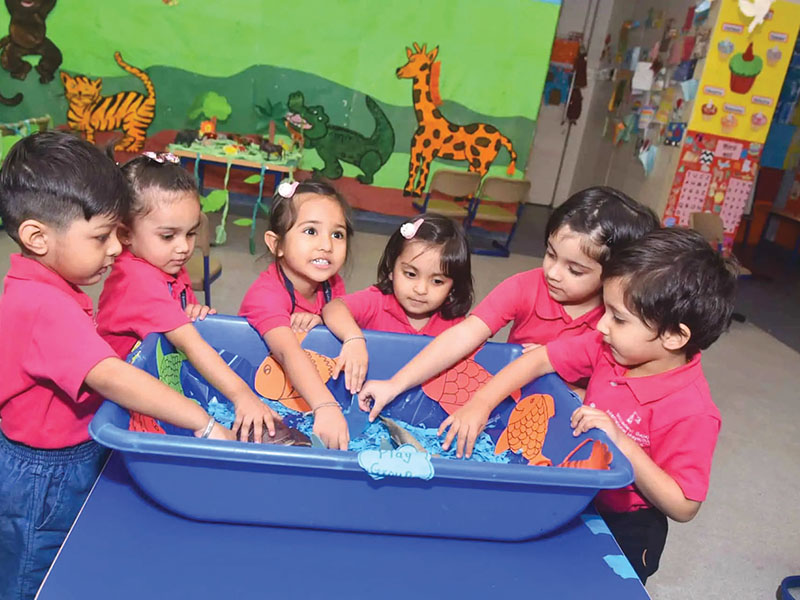Nasrin Modak Siddiqi (Mumbai)
Mumbai nursery children. Inset: Dr. Swati Popat Vats
With the national education Policy (NEP) 2020 having restructured the 10+2 school system of over half a century to the 5+3+3+4 system by tagging on three years of formal early childhood education, the BJP/Shiv Sena government has issued a circular to all schools statewide not to admit children below the age of three into nursery class. Henceforth, children enrolling into the nursery class will have to be three years of age, junior kindergarten (age four) and senior KG (age five) so that when children enter class I they will be six years of age as mandated by the Right to Education Act, 2009 and NEP 2020.
Indeed, acknowledging the critical importance of early childhood care and education (ECCE) — a cause propagated by EducationWorld since 2010 — the Dr. K. Kasturirangan Committee on which NEP 2020 is based, proposed that three years of professionally provided ECCE should be extended to class II with the first five years described as “foundational education”.
Suraj Mandhare, education commissioner, believes that three to six years are critical for child development. Thus far, in most pre-primary schools there wasn’t any distinction between playschool/crèches and nursery. “Therefore, children who were enrolled in playschool were often promoted to nursery — formal ECCE — at very young age which is not advisable for their orderly growth and development. As per NEP 2020, foundational primary education is from nursery to class II to give children a firm foundation to derive the benefit of further education. The state government’s circular is to ensure that from the next academic year children don’t start nursery education before age three. A draft Bill has been prepared to regulate and standardise ECCE,” says Mandhare.
Dr. Swati Popat Vats, President of the Early Childhood Association (estb.2010) which has a membership of over 40,000 preschools/members nationwide, welcomes this circular and proposed legislation. “This means all preschools — government, non-government, private, NGOs — will have to admit children into nursery classes after they attain the age of three. All preschools will have to register on a government portal and provide details of teachers, their qualifications, the number of children enrolled with their age details and align their curriculums with the National Curriculum Framework for Foundational Stage (NCF-FS) 2022. This will formalize ECCE and nursery education,” says Dr. Vats.
This rule will become applicable from the academic year 2024-25. Therefore, the question arises what will be the status of children who were signed up in playschool at young age and have already been admitted in nursery class at ages below three? “Children below three years in nurseries will have to mark time in nursery class before being promoted to Junior KG. This is not a bad thing as it will make them better prepared for the next higher class. That’s why this age mandate is operational from the next academic year. But from April/June — as academic year starts in these months — 2024, no child below age three should be admitted into nursery to ensure that she enters primary education at age six as mandated by the Right of Children to Free & Compulsory Education (RTE) Act, 2009 and NEP 2020,” says Dr. Popat Vats.
The probability is that this provision will be clearly spelt out in a comprehensive Bill regulating ECCE which is under preparation in the state legislative assembly. Meanwhile within the sentient educators community there is general satisfaction that ECCE — including early years education in 1.39 million anganwadis promoted by the Central government — is finally getting the importance it deserves.
Also read: Committed ECCE educator
